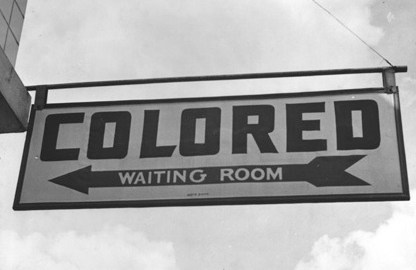Do We Have a Right to Discriminate?

When pressed, Rand Paul now says that he would have voted for the Civil Rights Act. But Paul, who just won the Republican nomination for Senate in Kentucky, does have a problem with the provision that makes it crime for private businesses to discriminate against on the basis of race. Private businesses have a right not to serve black people, he told Rachel Maddow this week. In fact, he said, if he had been in office when the bill was passed, he would have fought to get rid of that provision.
In an editorial, the Louisville Courier-Journal called Paul’s position “repulsive to people in the mainstream.” The provision in the Civil Rights Act that makes Paul uncomfortable is, after all, the one that put an end to the widespread system of private discrimination that made blacks second-class citizens throughout much of the country. Without it there would still be whites-only lunch counters, and blacks would have an even harder time buying houses or finding jobs. The Civil Rights Act helped transform our national culture, by making the routine discrimination of previous generations seem socially unacceptable.
Paul’s comments about the Civil Rights Act can’t make the Republican leadership happy. Republicans have long been accused of playing on white resistance to segregation after the passage of the Civil Rights Act. Republican National Committee Chairman Michael Steele recently conceded as much, to the horror other Republican leaders. Now Arizona’s controversial new law allowing the police to demand proof of citizenship from anyone suspected of being illegal puts the party in the position of choosing between its passionate base and the growing Hispanic community it needs to win national elections. And the increasingly influential Tea Party has produced some ugly racially-tinged rhetoric. It can’t help to have Paul, a rising Republican star and one of the Tea Party’s most prominent members, seem to come out against Martin Luther King’s legacy.
Nevertheless, it’s not fair to call Paul racist. He has made it clear that he finds discrimination of any type offensive, and that he would refuse to do business with any establishment that did discriminate. He says he would have marched with King on Washington. Paul’s problem with the Civil Rights Act is that he doesn’t think it’s appropriate for the government to say who people can and can’t do business with, however abhorrent their choices may be. Such legislation, Paul has repeatedly argued, infringes on our freedom of speech (and, presumably, on our freedom of assembly). As Allahpundit says, Paul’s “reservations about the law have to do not with the ends but with the means of federal compulsion; he wants business owners to serve everyone but clearly prefers using boycotts and local laws to pressure them.” Paul has attacked the Fair Housing Act on the same grounds, saying that “A free society will abide unofficial, private discrimination, even when that means allowing hate-filled groups to exclude people based on the color of their skin. It is unenlightened and ill-informed to promote discrimination against individuals based on the color of their skin. It is likewise unwise to forget the distinction between public (taxpayer-financed) and private entities.” It may be unpleasant to tolerate private discrimination, but, he says, that’s “the hard part of believing in freedom.”
In face of widespread criticism, however, Paul told Wolf Blitzer yesterday that “there was an overriding problem in the South that was so big that it did require federal intervention in the 60s.” And Paul’s spokesman now says—in spite of what Paul told Maddow—that Paul “supports” the government’s power to ensure that businesses don’t discriminate on the basis of race. Still, as Greg Sargent says, Paul seems reluctant to say straight out that the government can regulate private behavior in this way. He has the appearance of someone who is struggling to decide between sticking to their principles and getting elected to the Senate.
Paul’s original point is in any case worth considering: there is a cost to having the government legislate private behavior. There are injustices it may not be the government’s place to fix. Nevertheless, Paul’s reluctance to endorse the Civil Rights Act points up the fundamental problem with the libertarian view: grave social ills like widespread discrimination may go unaddressed. It’s fine to say we should boycott those who discriminate rather than let the government to step in, but there are times when private action can’t effect change quickly enough. If Paul is guilty of anything, it’s not racism, but of being too insensitive to the terrible injustice suffered by blacks before the passage of the Civil Rights Act. Refusing to employ or to do business with people is not like saying offensive things to them; it does more than just hurt their feelings.





